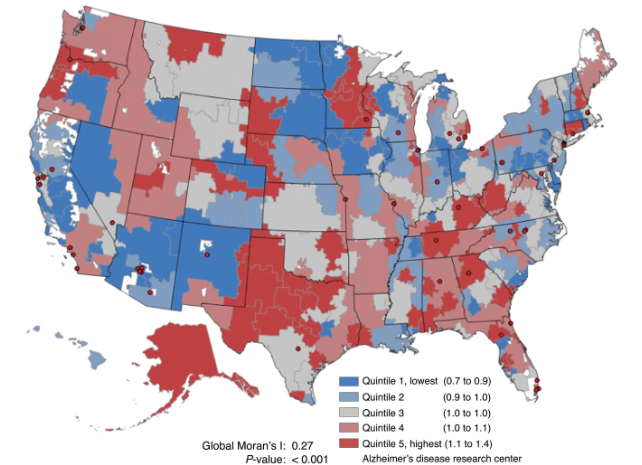Relocating from one state to a different might make a big distinction in whether or not you obtain a dementia prognosis, no matter your mind’s precise state of well being.
An observational measure of the ‘diagnostic depth‘ of Alzheimer’s illness and associated dementias carried out by a crew led by the College of Michigan within the US has uncovered a regarding diploma of variation in instances between areas throughout the nation.
Relying in your place of residence, you can be as much as twice as prone to qualify as having a severe neurodegenerative situation, particularly in the event you occur to be in your late sixties or early seventies.
After all totally different populations will expertise larger or decrease environmental dangers for dementia, and there’ll all the time be demographic variations in genetic influences. But even when contributing elements are accounted for, a regarding sample stays.
“These findings go beyond demographic and population-level differences in risk, and indicate that there are health system-level differences that could be targeted and remediated,” says lead writer Julie Bynum, a geriatrician and well being care researcher from the College of Michigan.
Figuring out whether or not a person’s cognitive decline is attributable to a gradual lack of neurons requires a battery of checks carried out by medical professionals who function beneath a spread of legal guidelines, tips, and suggestions.
Whereas medical definitions could also be comparatively constant throughout county, state, and even nationwide borders, human habits is something however predictable. Quirks in regional paperwork, particular person interpretations of guidelines and rules, budgetary choices, doctor beliefs, high quality management measures, affected person calls for … the listing of extraneous influences over how checks are administered and interpreted is lengthy and complex.
Bynum and her crew used 4.8 million Medicare claims recorded throughout 2018 and 2019 to map latest dementia diagnoses throughout hospital referral areas within the US.
Utilizing statistical fashions to estimate the variety of instances every area ought to see based mostly on their populations, they calculated every space’s prognosis depth – a ratio of precise instances to anticipated numbers. This was then used to find out how a lot an individual’s regional threat of prognosis would possibly impression their particular person threat of prognosis.
As is perhaps anticipated, important variations within the relative variety of folks recognized with ADRD might be seen throughout the nation, many relying on the unfold of sexes, ages, racial distributions, and different healthcare elements.
The prognosis price for these aged 66 to 74 was 2 out of each 100 folks, for instance, in contrast with 23 per 100 for these over 85. White populations featured a price of 6.6 p.c throughout referral areas, whereas Black populations had a price of 9 p.c.
Provided that the southern US has the highest focus of Black folks, it is maybe not stunning to search out the very best unadjusted price of ADRD instances within the South, particularly in states like Texas and Florida.
Taking anticipated figures into consideration in measures of precise diagnoses revealed a really totally different map, from locations like Minot North in Dakota having simply over two-thirds of the instances they is perhaps anticipated to have, to Wichita Falls in Texas, with almost 50 p.c extra instances than predicted statistically.

“The message is clear: from place to place the likelihood of getting your dementia diagnosed varies, and that may happen because of everything from practice norms for health care providers to individual patients’ knowledge and care-seeking behavior,” says Bynum.
Realizing this variation exists is essential to making sure the utmost variety of folks obtain crucial help for his or her ailing psychological well being. Whereas an estimated 6.9 million Individuals over the age of 65 have a prognosis of dementia, there are various extra who’ve signs of cognitive decline however are but to have any formal situation acknowledged.
This not solely means they might be lacking out on sources that would make their lives simpler, but it surely makes it tougher for themselves and their households to organize for the years forward.
“For communities and health systems, this should be a call to action for spreading knowledge and increasing efforts to make services available to people,” says Bynum.
“And for individuals, the message is that you may need to advocate for yourself to get what you need, including cognitive checks.”
This analysis was printed in Alzheimer’s and Dementia.

